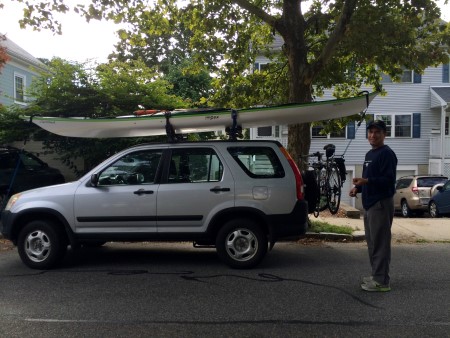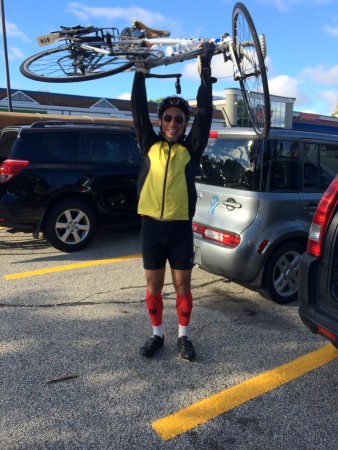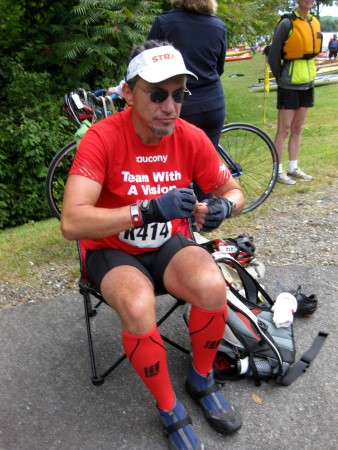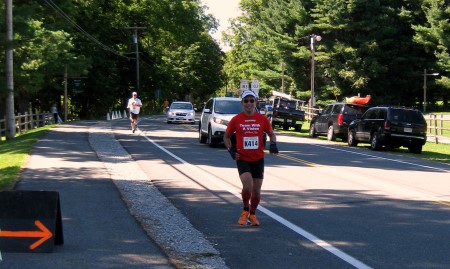 Last weekend, Ruth and I went to Lenox for the Josh Billings RunAground Triathlon. I don’t swim much, so I’ve never done a typical tri, but the Josh has a 5 mile paddle in between a 27 mile bike leg and a 6 mile run, making it ideal for not only my first tri, but my first bike race of any kind. So Saturday morning we threw the boat on the top of the car, hung the bike on the rack, and took the Mass Pike west for the race.
Last weekend, Ruth and I went to Lenox for the Josh Billings RunAground Triathlon. I don’t swim much, so I’ve never done a typical tri, but the Josh has a 5 mile paddle in between a 27 mile bike leg and a 6 mile run, making it ideal for not only my first tri, but my first bike race of any kind. So Saturday morning we threw the boat on the top of the car, hung the bike on the rack, and took the Mass Pike west for the race.
This was my third Josh, but my first as an Ironperson (solo athlete). I did the boat leg as part of a pick-up relay team in 2011 and had so much fun that I formed a team with some friends for 2012 and did the run leg.
It doesn’t hurt that the event is held in beautiful countryside, and that the early fall weather is usually gorgeous. This year was cooler than the other two, but still sunny – excellent weather for racing, though not quite as nice for the spectators.
I was looking for a (hopefully fun) learning experience. I knew I wouldn’t be totally recovered after my century ride three weeks before the race, so I didn’t really train to compete, just to make it through the event in good shape.
 The bike leg starts at a Price Chopper in Great Barrington and follows hilly roads to the boat put-in at the Stockbridge Bowl.
The bike leg starts at a Price Chopper in Great Barrington and follows hilly roads to the boat put-in at the Stockbridge Bowl.
I didn’t want to wipe myself out with a paddle and run to follow, so I didn’t go all-out. I’d call it “fast touring” pace, always pushing, but keeping a high cadence and not straining.
I started at the back of the pack since it was my first bike race, figuring that I could weave my way through slower riders if the opportunity presented itself, the same way I’d do in a marathon.
But riding alone was more of a disadvantage than I realized it would be. I’d heard that drafting was important in bike racing, but I found was that it was much more important than I’d guessed.
Back where I was in the field, I could go by most of the riders without too much effort on the uphills. That left me riding by myself once we reached the top of the hill. The riders drafting in a pack would easily reel me back in, especially on the downhills.
The trick is apparently to find the right pack early in the race. Over time I managed to drop the slower packs and catch up with the one ahead, but I would have been much better off to go with a faster pack from the start. If I race again, I’m sure I’ll make the opposite mistake, and try to go with a pack that’s too fast, but it should be a lot easier (though more depressing) to drop to a slower pack than it was try to catch faster packs while riding alone.
It was a learning experience, which was fun. After hundreds of running races, I’d almost forgotten what it was like to be the newbie.
The 27 miles took me about 1:40, an average of 16 MPH. Not all that fast, but it was faster than I’d ever ridden for any distance before.
 Ruth was waiting to help me through the bike/paddle transition. Once I got off the bike and on the water, I started regularly passing people. It didn’t hurt that I had a better boat that most of the other slow bikers. Ruth’s friend Allison volunteered at the boat/run transition, so she was there to help deal with the boat while I struggled to get socks on over my wet feet. My time for the boat leg (which includes both transitions) was 1:11.
Ruth was waiting to help me through the bike/paddle transition. Once I got off the bike and on the water, I started regularly passing people. It didn’t hurt that I had a better boat that most of the other slow bikers. Ruth’s friend Allison volunteered at the boat/run transition, so she was there to help deal with the boat while I struggled to get socks on over my wet feet. My time for the boat leg (which includes both transitions) was 1:11.
The run was a lot like the last 6 miles of a marathon, if I had done a poor job of pacing the first 20. My legs were tired from biking and stiff from an hour cramped in my kayak. But I have a vast amount of experience running on dead legs, more than most people, so I continued to pick runners off as I made my way to the finish at Tanglewood in 49:30.
 I finished in 3:41:10, 299th out of 502 overall. I was 375th overall after the bike leg, but my splits improved to 270th on the boat leg and 206th for the run, so I picked up about 40 places on each leg.
I finished in 3:41:10, 299th out of 502 overall. I was 375th overall after the bike leg, but my splits improved to 270th on the boat leg and 206th for the run, so I picked up about 40 places on each leg.
My time was 64th out of 138 Ironpeople, 102nd on the bike, 41st in the boat, and 32nd on the run. In my category (50+ men with kayak), I was 15th out of 23, 19th pedaling, 15th paddling, and 3rd perambulating.
I had fun, learned a lot, and gained a massive amount of respect for the effort involved in training for and competing in a triathlon. I’m not sure I’ll ever want to spend all the time needed to train to be good at three sports. One is enough – the others can remain cross-training.
Here’s the track for the bike leg from my Garmin: http://connect.garmin.com/activity/590892150
and the track for the entire race: from my watch: http://connect.garmin.com/activity/590889410
And here’s a tip for future Josh Billings Ironpeople: get your boat back before cleaning up and putting on dry clothes. You have to put your boat back in the water to get it from the storage spot to where you can take it out.

Race pics, but not me as far as I could tell:
http://photos.berkshireeagle.com/2014/09/14/photos-the-38th-annual-josh-billings-runaground/#1